Hunting and Fishing News & Blog Articles
2 minutes reading time (424 words)
Ensuring safety while using a recreational vehicle (RV) is crucial for a pleasant and secure travel experience. Here are some important RV safety tips:
Regular Maintenance:Conduct regular inspections of your RV, checking for any mechanical issues, tire wear, and fluid levels. Keep up with routine maintenance to prevent breakdowns on the road.Tire Safety:Check tire pressure regularly, including the spare tire. Underinflated or damaged tires can lead to blowouts, especially when carrying a heavy load.Weight Distribution:Be mindful of weight distribution inside the RV. Distribute weight evenly to prevent overloading and maintain proper balance for safe handling.Safe Driving Practices:Drive at a safe and reasonable speed, especially when navigating turns or driving on unfamiliar roads. Avoid sudden maneuvers and maintain a safe following distance.Weather Awareness:Stay informed about weather conditions along your route. Be prepared for adverse weather and adjust your travel plans if necessary.Know Your RV's Height:Be aware of the height of your RV to avoid collisions with low overpasses, bridges, or other obstacles. Many RVs have higher clearance, so knowing your vehicle's dimensions is essential.Brake Safety:Ensure that the RV's brakes are in good working condition. Regularly check brake fluid levels and respond promptly to any signs of braking issues.Emergency Kit:Keep an emergency kit on board, including items such as a first aid kit, flashlight, basic tools, spare fuses, and essential medications.Fire Safety:Install smoke detectors and carbon monoxide detectors in the RV, and regularly test them. Have a fire extinguisher on hand and know how to use it. Establish a fire escape plan with all passengers.Propane Safety:If your RV uses propane, inspect the system regularly for leaks. Ensure that appliances are turned off when not in use, especially before driving.Campground Safety:When parked at a campground, be aware of your surroundings. Level your RV properly to prevent accidents and use wheel chocks to secure it in place.Water System Safety:Regularly inspect the RV's water system for leaks and ensure the water heater is functioning correctly. Follow proper procedures for filling and draining the fresh water tank.RV Insurance:Ensure that your RV insurance is up to date and provides adequate coverage for your needs. Familiarize yourself with the policy and know how to report a claim if necessary.By following these RV safety tips, you can help ensure a safe and enjoyable journey on the road with your recreational vehicle. Always stay informed, be proactive about maintenance, and prioritize the well-being of yourself and your passengers.
© 2024 WEnRV.com, a division of Outdoorsmen.com, Inc. Contact Us: 1 (888) 838-3396
3 minutes reading time (516 words)
RV solar panels are a popular and environmentally friendly way to generate electricity for your recreational vehicle. Here are some tips to help you make the most of your RV solar panel system:
Understand Your Energy Needs:Determine your RV's energy requirements by assessing the power consumption of appliances, lights, and devices you plan to use. This will help you choose an appropriately sized solar panel system and battery bank.Select High-Quality Solar Panels:Invest in high-quality solar panels with good efficiency ratings. Monocrystalline solar panels are known for their high efficiency and durability, making them a popular choice for RVs.Consider Portable Solar Panels:Portable solar panels provide flexibility, allowing you to park your RV in the shade while placing the panels in a sunny location. They are also useful if you need to park your RV away from your campsite to maximize sunlight exposure.Install a Solar Charge Controller:A solar charge controller regulates the voltage and current coming from the solar panels to prevent overcharging your RV's batteries. Choose a controller with the appropriate capacity for your system.Use Deep Cycle Batteries:Invest in high-quality deep cycle batteries designed for frequent charging and discharging. These batteries are well-suited for RV solar systems and can provide reliable power storage.Install an Inverter:An inverter converts the DC power generated by your solar panels into AC power for your RV's appliances and devices. Choose an inverter with sufficient capacity to handle your peak power needs.Regularly Inspect and Clean Panels:Keep your solar panels clean and free from debris. Regularly inspect the panels for any damage and clean them with a soft brush and mild soap to maximize their efficiency.Optimize Solar Panel Tilt and Orientation:Adjust the tilt and orientation of your solar panels to maximize sunlight exposure. Tilting them towards the sun during different parts of the day and aligning them southward in the northern hemisphere (or northward in the southern hemisphere) can improve efficiency.Monitor Battery Levels:Install a battery monitor to keep track of your battery levels, charging status, and power consumption. This allows you to manage your energy usage and ensures that your batteries are adequately charged.Have a Backup Power Source:While solar panels can provide a reliable source of power, it's wise to have a backup power source, such as a generator or an alternator charging system, especially during extended periods of low sunlight.Educate Yourself on RV Solar Systems:Take the time to learn about RV solar systems, including their components and how they work. Understanding the basics will empower you to troubleshoot issues and make informed decisions about your system.Consult with Professionals:If you're not comfortable with the installation or troubleshooting process, consider consulting with professionals who specialize in RV solar systems. They can ensure your system is properly installed and optimized for your needs.Remember that the effectiveness of your RV solar panel system depends on factors such as sunlight exposure, weather conditions, and your energy usage patterns. Regular maintenance and monitoring will help you get the most out of your RV solar setup.
© 2024 WEnRV.com, a division of Outdoorsmen.com, Inc. Contact Us: 1 (888) 838-3396
2 minutes reading time (499 words)
Proper tire maintenance is crucial for the safety and performance of your RV. Here are some tips for RV tire maintenance:
Check Tire Pressure Regularly:Maintain the recommended tire pressure as specified by the RV manufacturer. Underinflated or overinflated tires can lead to poor handling, reduced fuel efficiency, and increased risk of blowouts. Check the tire pressure before each trip and when the tires are cold.Inspect Tread Depth:Ensure that the tires have adequate tread depth. Insufficient tread can compromise traction and increase the risk of hydroplaning. Consider using a tread depth gauge to measure the tread depth periodically.Rotate Tires:Rotate your RV tires regularly to ensure even wear. This helps extend the life of the tires and contributes to better overall performance. Follow the recommended rotation pattern outlined in your RV owner's manual.Balance Tires:Have the tires balanced when they are rotated or replaced. Balancing ensures even wear and a smoother ride. Imbalanced tires can lead to vibrations, affecting both the tires and other components of the RV.Alignment Checks:Periodically check the wheel alignment of your RV. Misalignment can cause uneven tire wear, affecting handling and fuel efficiency. If you notice uneven wear patterns, have the alignment checked and corrected by a professional.Inspect for Damage:Regularly inspect your RV tires for signs of damage such as cuts, bulges, or punctures. If you notice any visible damage, address it promptly. Damaged tires are more prone to failure.Protect Tires from UV Rays:UV rays from the sun can accelerate tire aging and deterioration. Whenever possible, park your RV in the shade or use tire covers to protect the tires from direct sunlight.Mind the Weight Limits:Adhere to the weight limits specified for your RV. Overloading can lead to excessive strain on the tires and other components. Check the RV's Gross Vehicle Weight Rating (GVWR) and ensure that your vehicle and belongings do not exceed this limit.Stabilize When Parked for Extended Periods:When your RV is parked for an extended period, consider using leveling jacks and stabilizers to relieve pressure on the tires. This helps prevent flat spots and uneven wear.Spare Tire Maintenance:Don't forget about your spare tire. Ensure that it is properly inflated and in good condition. Periodically check the spare tire along with the other tires on the RV.Temperature Considerations:Extreme temperatures can affect tire performance. In hot weather, ensure proper tire inflation, and in cold weather, check for tire pressure drops due to temperature changes.Replace Tires as Needed:Tires have a limited lifespan, typically 6-10 years, even if they have sufficient tread. Replace RV tires based on their age and condition, not just tread wear.Professional Inspection:Consider having a professional RV service center inspect your tires regularly. They can identify issues that may not be apparent during routine checks.Remember that proper tire maintenance is essential for safe RV travel. Regular inspections and proactive measures can prevent issues and contribute to a smoother, safer journey.
© 2024 WEnRV.com, a division of Outdoorsmen.com, Inc. Contact Us: 1 (888) 838-3396
2 minutes reading time (457 words)
Driving an RV can be a different experience compared to driving a regular car. Here are some tips to help you navigate and enjoy your RV journey:
Practice Driving:If you're new to driving an RV, practice in an open area like an empty parking lot. Get a feel for its size, turning radius, and braking distance.Know Your RV's Dimensions:Be aware of the height, width, and length of your RV. Pay attention to clearance signs, especially when driving under bridges, through tunnels, or entering parking garages.Drive at a Comfortable Speed:RVs generally have a lower speed limit, and it's important to drive at a speed that you are comfortable with. Take your time and avoid rushing.Use Mirrors:RVs have large blind spots, so use your side mirrors frequently. Adjust them properly before starting your journey, and consider using additional convex mirrors for a wider field of view.Plan Your Routes:Use RV-specific GPS devices or apps to plan your routes. These tools can help you avoid low bridges, narrow roads, and other obstacles that may be challenging for larger vehicles.Stay Informed about Road Conditions:Check the weather and road conditions before starting your journey. Inclement weather, road closures, or construction can affect your travel plans.Take Breaks:RV driving can be tiring. Plan regular breaks to rest, stretch your legs, and stay alert. Fatigue can affect your concentration and reaction time.Be Mindful of Weight Distribution:Properly distribute the weight in your RV to ensure stability on the road. Follow the manufacturer's guidelines for loading and securing your belongings.Brake Carefully:RVs have a longer stopping distance than regular vehicles. Brake gently and allow for extra space between you and the vehicle in front of you.Be Cautious on Turns:Take wide turns to avoid clipping curbs or obstacles. Be aware of the swing of your RV's rear end during turns.Check Tire Pressure:Regularly check and maintain proper tire pressure. Underinflated or overinflated tires can affect your RV's handling and fuel efficiency.Plan for Fuel Stops:RVs have larger fuel tanks, but fuel stations for larger vehicles may be less frequent. Plan your fuel stops accordingly and fill up when you have the chance.Know the RV's Systems:Familiarize yourself with the RV's systems, including the electrical, water, and sewage systems. Regularly check these systems to ensure everything is functioning properly.Be Courteous on the Road:Drive courteously and share the road with other vehicles. Be patient and considerate, especially when navigating through traffic.Remember that driving an RV requires a different set of skills compared to driving a regular car. Take the time to become familiar with your RV and its handling characteristics to ensure a safe and enjoyable journey.
© 2024 WEnRV.com, a division of Outdoorsmen.com, Inc. Contact Us: 1 (888) 838-3396
2 minutes reading time (413 words)
There are several legendary RV spots and destinations that are popular among RV enthusiasts for their scenic beauty, unique experiences, and vibrant communities. Here are some of the well-known and legendary RV spots in various parts of the United States:
Quartzsite, Arizona:Quartzsite is famous for its massive RV gatherings, particularly during the Quartzsite RV Show. It's a mecca for snowbirds and RVers looking to connect, explore the surrounding desert, and attend the largest gathering of RVs in the nation.Key West, Florida:The Florida Keys, including Key West, offer tropical RV experiences. Boyd's Key West Campground is a popular spot, providing waterfront sites and easy access to the attractions of Key West.Yellowstone National Park, Wyoming/Montana/Idaho:Yellowstone is America's first national park, known for its geothermal wonders, wildlife, and stunning landscapes. There are RV-friendly campgrounds within the park, allowing visitors to experience its natural beauty.Grand Canyon National Park, Arizona:RVers can enjoy the breathtaking views of the Grand Canyon from the South Rim. Mather Campground and Trailer Village are popular RV camping options within the park.Moab, Utah:Moab is a haven for outdoor enthusiasts, with access to Arches National Park and Canyonlands National Park. RVers can explore the red rock landscapes and enjoy activities like hiking, mountain biking, and off-roading.Myrtle Beach, South Carolina:Myrtle Beach offers RV-friendly campgrounds along the Atlantic Ocean. RVers can enjoy the beach, entertainment options, and the vibrant atmosphere of this popular coastal destination.Napa Valley, California:RVers looking for a unique wine country experience can explore RV parks in Napa Valley. Enjoy wine tasting, vineyard tours, and the beautiful landscapes of California's wine country.The Florida Panhandle:The Florida Panhandle boasts beautiful white-sand beaches and RV-friendly campgrounds. Destin, Panama City Beach, and Pensacola are popular destinations for RVers seeking a coastal getaway.Mackinac Island, Michigan:While RVs are not allowed on Mackinac Island, the surrounding area, including Mackinaw City and St. Ignace, offers RV-friendly campgrounds. Visitors can explore Mackinac Island by ferry and enjoy its historic charm.Sedona, Arizona:Surrounded by stunning red rock formations, Sedona is a popular destination for RVers seeking natural beauty, hiking trails, and spiritual experiences. RV parks in the area offer a serene setting.Remember that the popularity of RV spots can vary based on personal preferences, interests, and the type of RV experience you're seeking. Always check campground availability, make reservations when necessary, and be aware of any restrictions or regulations in the areas you plan to visit.
Spring blooms with flowers and the promise of adventure for outdoor enthusiasts. As the seasons shift, the folding pop-up camper emerges as the unsung hero for those seeking to embrace nature fully. Its unique blend of convenience, comfort, and versatility makes it an ideal choice for spring getaways. Let us dive into the ten compelling reasons to choose a folding pop-up camper this season.
Get the most out of your adventures with thisFlagstaff Flagstaff Pop Up 425M Folding Pop-Up Camper.Affordability
Folding pop-up campers are an economically savvy choice, providing a budget-friendly way to enjoy the RV lifestyle. Their lower price point than traditional RVs makes them accessible entry points for first-time buyers or those looking to downsize.
Ease of Towing
Their lightweight design makes pop-up campers a breeze to tow, often not requiring a specialized vehicle. This translates to better fuel efficiency and less wear on your car, making the journey to your destination as carefree as your stay.
Take home thisForest River RV Flagstaff MACLTD Series 205S Folding Pop-Up Campertoday!Simple Setup
Gone are the days of battling with traditional tents. The mechanism of folding pop-up campers is designed with convenience in mind, ensuring that your setup can be quick and effortless. This means more exploring, relaxing, and less time fiddling with poles and stakes.
The folding dinette in thisCoachmen RV Clipper Camping Trailers 108ST Sport Folding Pop-Up Camper.Close to Nature
One of the beauties of a pop-up camper is the feeling of being closer to nature. The canvas sides allow you to enjoy the sounds, scents, and breezes of the outdoors while still providing shelter from the elements, offering an immersive outdoor experience.
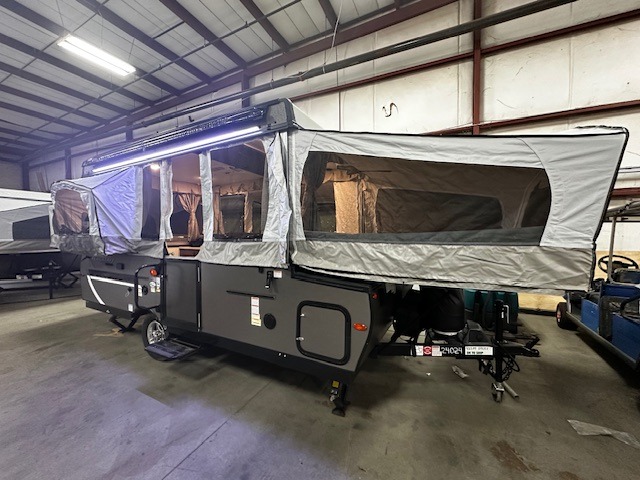
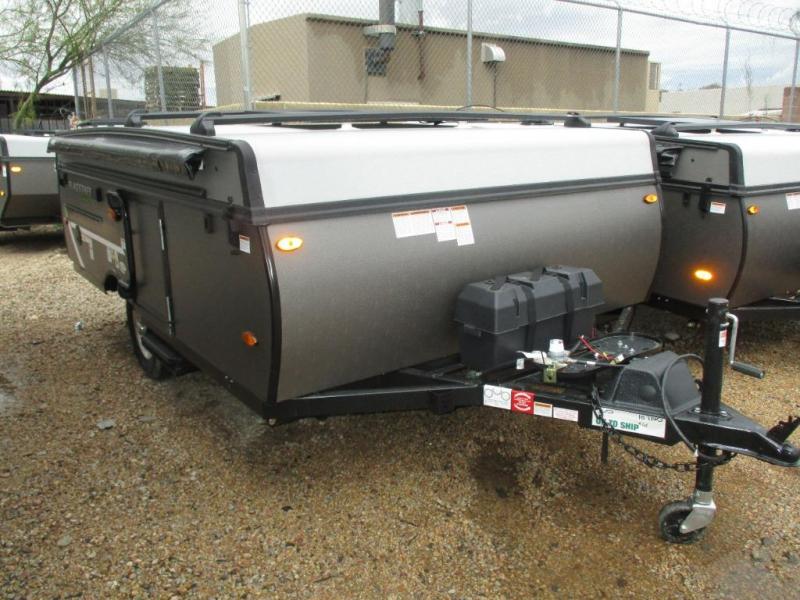
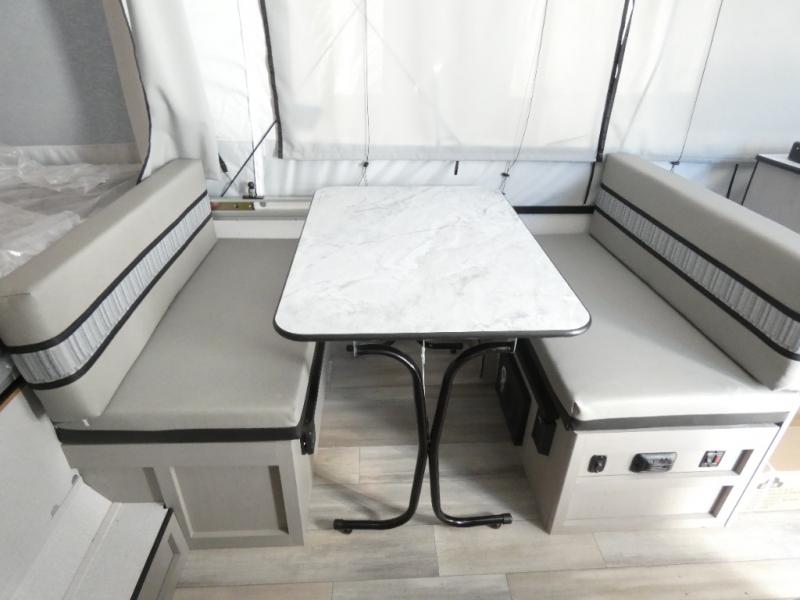
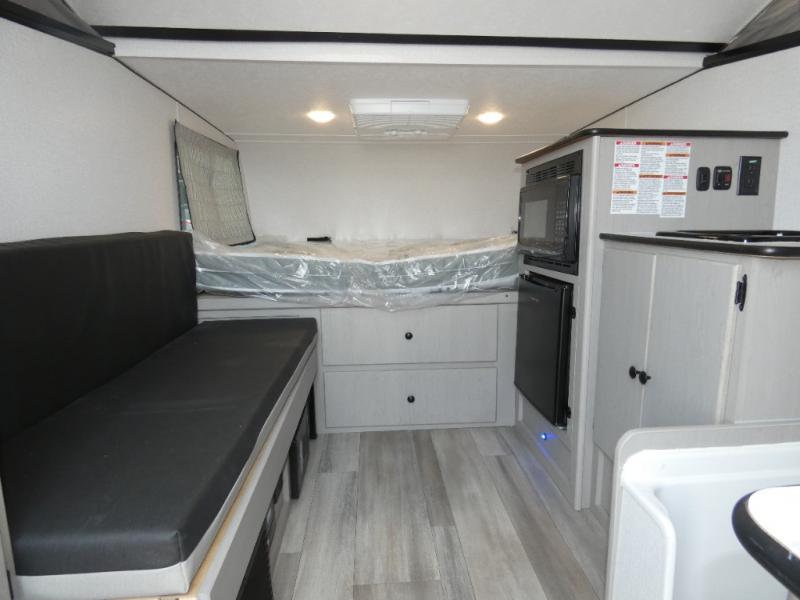
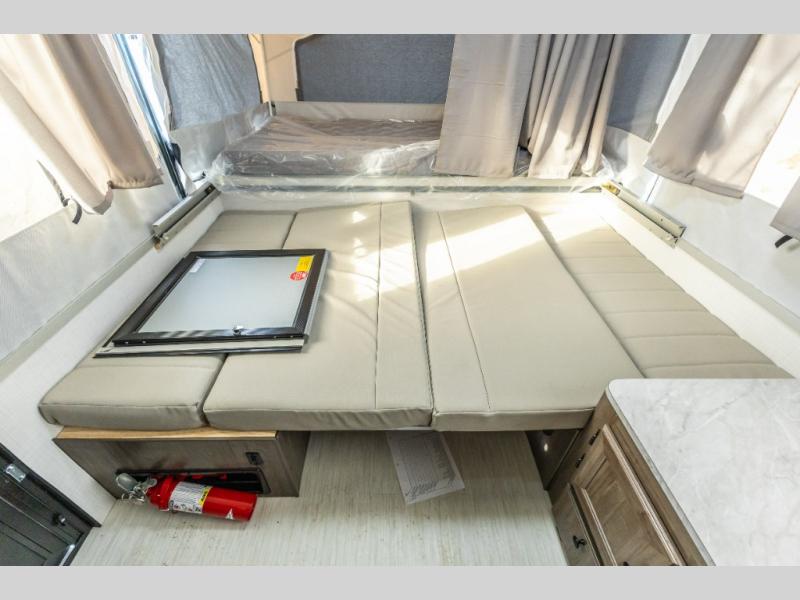
Camp under Montana’s big sky at Indian Springs Ranch Golf & RV Resort in Eureka. Located at the base of the Rocky Mountains, the new resort puts campers in one of western Montana’s most scenic regions with state-of-the-art amenities and a slew of nearby recreation possibilities.
Just five miles south of the Canadian border, the resort is nestled within Indian Springs, a vibrant community located between Whitefish and the Purcell mountains. Indian Springs offers deluxe accommodation suites and a premier 18-hole golf course. Encompassing hundreds of acres, Indian Springs has several outstanding real estate opportunities.
Glacier National Park. Getty Images
Going to Glacier
After settling into one of the well-appointed sites, adventurers will have plenty of choices for recreation. For an unforgettable day trip, head west to Glacier National Park, comprising approximately one million acres of surreal lakes and towering peaks. A drive along the iconic Going-to-the-Sun Road leads motorists to unparalleled views of the surrounding peaks. The park is home to 762 lakes, many of which accommodate fishing, kayaking, and canoeing. Hikers can soak in dramatic views by taking the Highline Trail, an 11.8-mile out-and-back hike that follows the Continental Divide.
Lake Coocanusa was formed by the damming of the Kootenay River. Getty Images
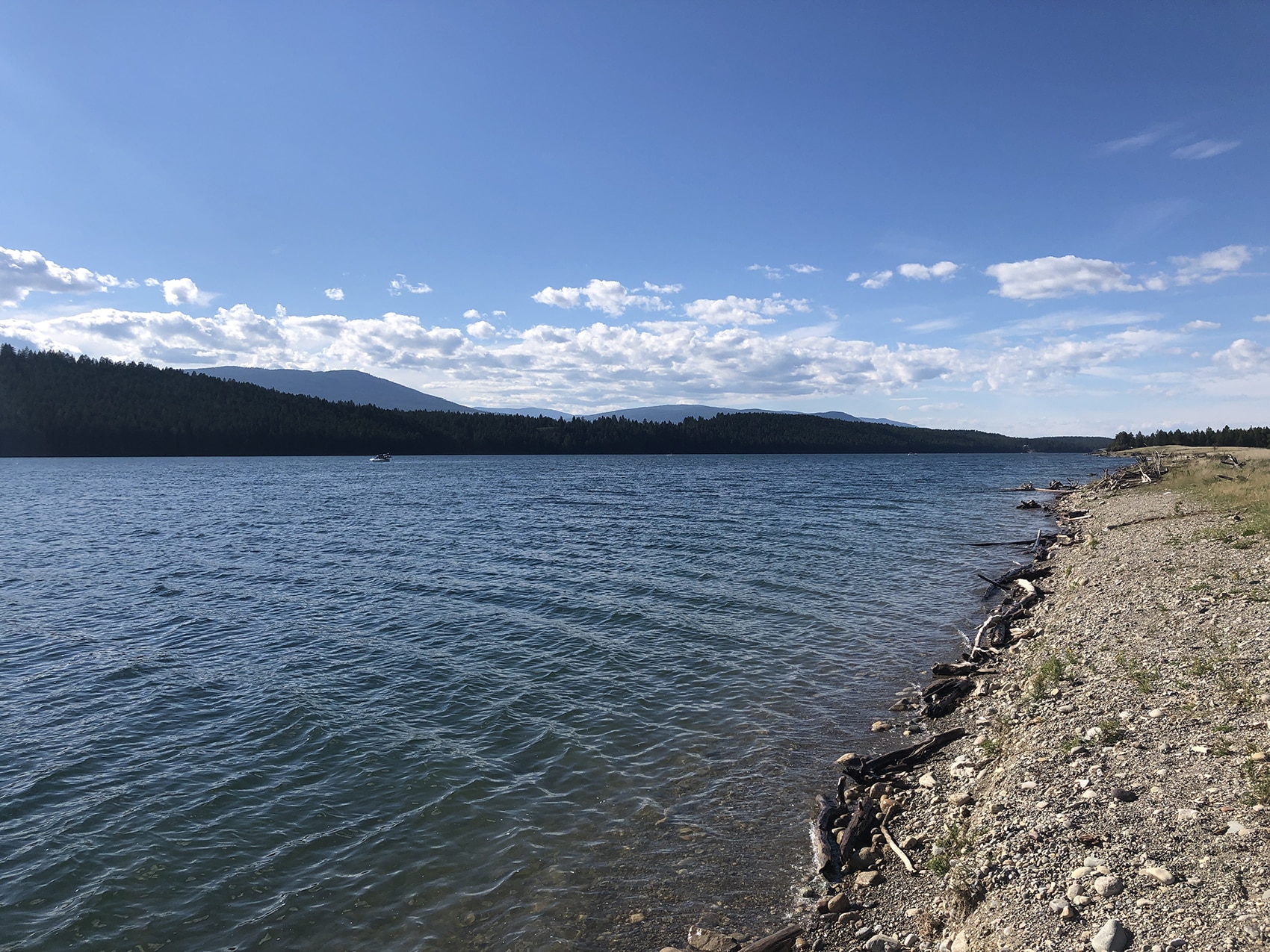
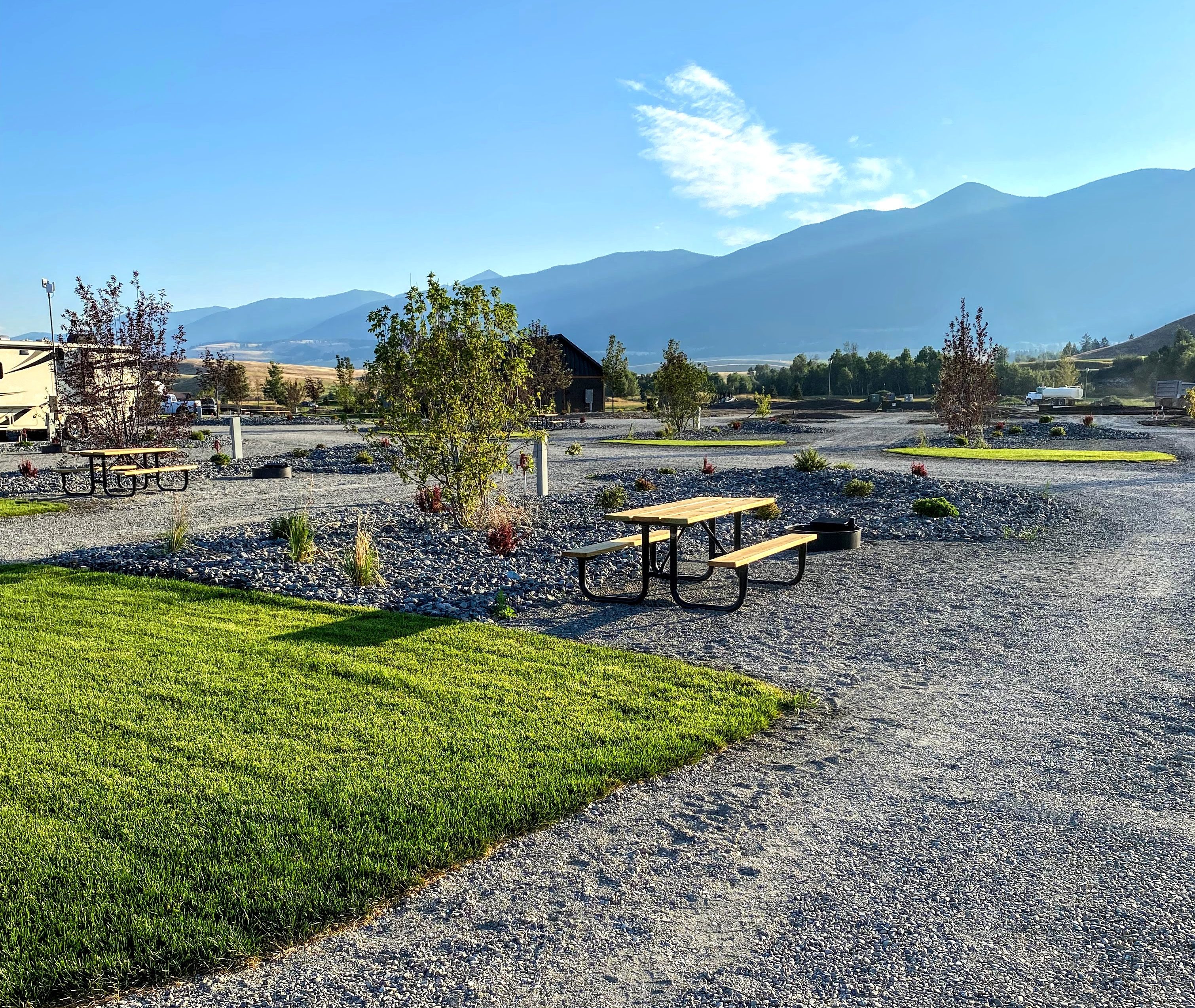
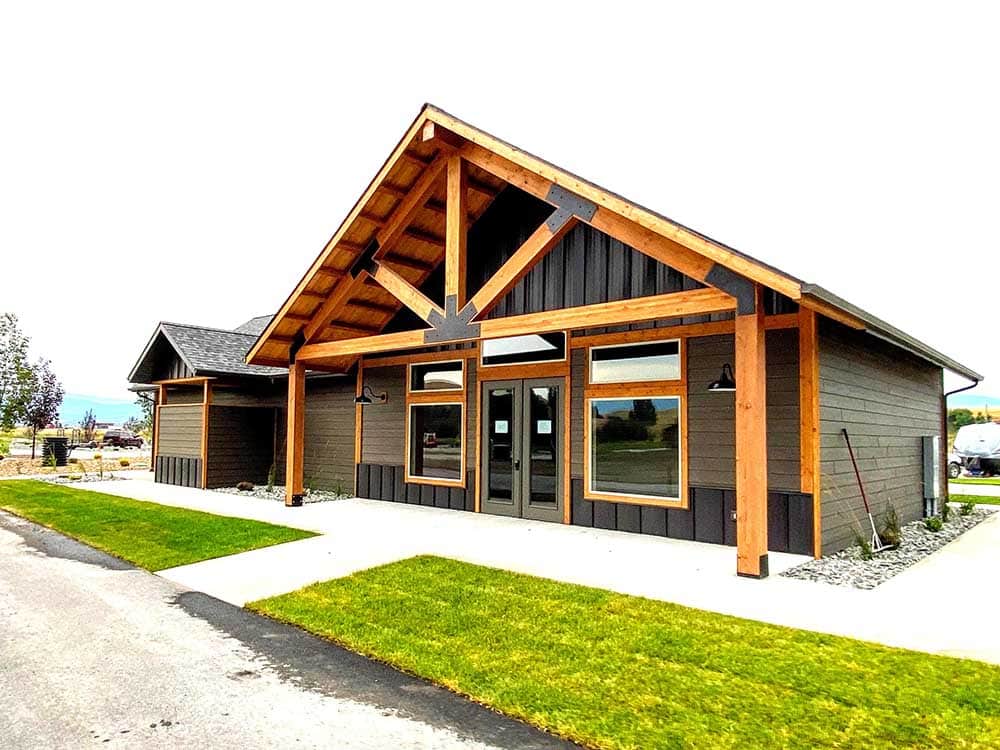

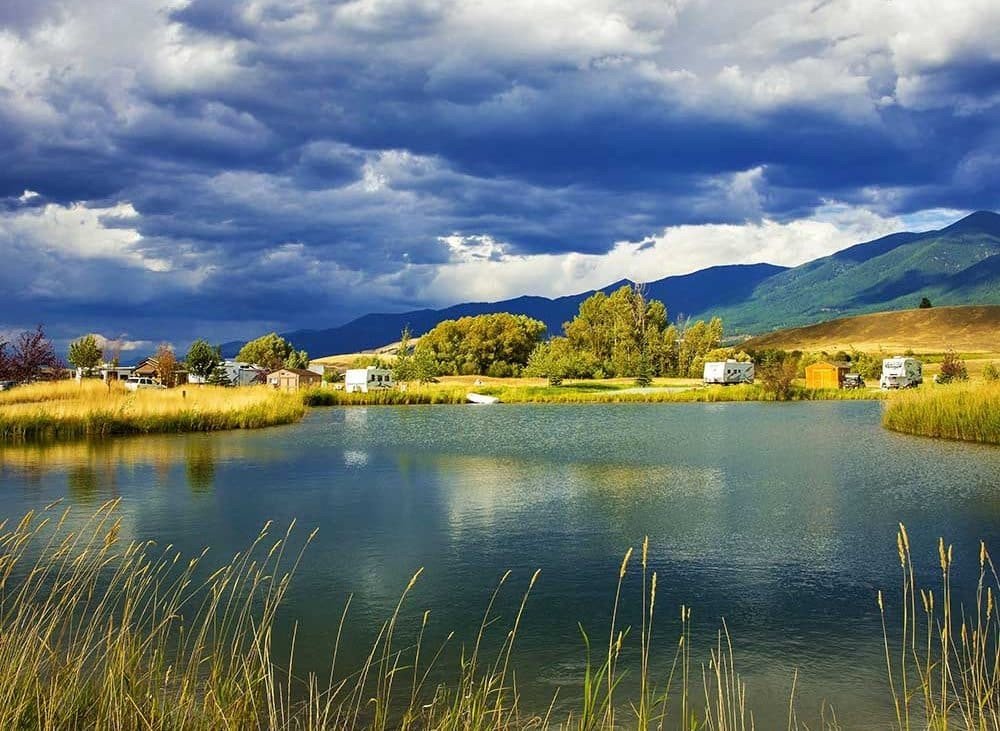
2 minutes reading time (438 words)
Recreational vehicles (RVs) and national parks often go hand in hand, providing a unique and adventurous way to explore the natural beauty and diverse landscapes of different regions. Here are some key points to consider when bringing an RV to national parks:
Campground Facilities:Many national parks offer RV-friendly campgrounds equipped with facilities such as electrical hookups, water, and sanitation stations. However, the availability of these amenities can vary, so it's advisable to check in advance and make reservations if possible.RV Size Restrictions:National parks may have restrictions on the size of RVs allowed in certain campgrounds or on specific roads. Be aware of any size limitations and plan accordingly.Reservations:Given the popularity of national parks, especially during peak seasons, it's recommended to make campground reservations in advance. Some parks have limited RV spaces, and reservations ensure you have a spot.Generator Policies:Understand the park's policies regarding generator use. Some parks have designated hours for generator operation to minimize noise and environmental impact.Dump Stations:National parks usually provide dump stations for RVs to dispose of wastewater. Be aware of the location of dump stations within the park.Park Shuttle Systems:Some national parks operate shuttle systems to reduce traffic congestion. Consider using park shuttles or public transportation when available to explore the park without the need to drive your RV.Park Regulations:Familiarize yourself with the specific regulations of each national park. Rules regarding pets, hiking, and recreational activities may vary.Road Conditions:Be aware of the road conditions within the park. Some roads may be narrow or winding, and certain areas may have restrictions on RV travel.Wildlife Awareness:National parks are home to diverse wildlife. Be cautious and follow guidelines to minimize human-wildlife interactions. Store food securely to avoid attracting animals to your RV.Seasonal Considerations:Some national parks have seasonal closures or restrictions. Research the best time to visit based on weather conditions and park accessibility.Leave No Trace Principles:Adhere to the principles of "Leave No Trace" to minimize your impact on the environment. Respect natural habitats, pack out all waste, and follow park guidelines for responsible camping.Accessibility:Check the accessibility of trails and attractions within the park. Some areas may not be suitable for RVs, and you may need to explore on foot, bike, or park-approved shuttles.Remember that each national park has its own set of rules and regulations, so it's crucial to research and plan accordingly before bringing an RV. National parks offer a wonderful opportunity to experience the beauty of nature, and responsible RV travel ensures a positive experience for both visitors and the environment.
© 2024 WEnRV.com, a division of Outdoorsmen.com, Inc. Contact Us: 1 (888) 838-3396
2 minutes reading time (376 words)
Location: Quartzsite, Arizona, USA
Duration: The Quartzsite RV Show typically takes place annually in January.
Key Features:
Massive RV Gathering:Quartzsite attracts a significant number of RVers, making it a hotspot for the RV community. Thousands of RVs converge on the area, creating a unique and vibrant atmosphere.Vendor Exhibits:The show features a vast array of vendor exhibits. RV-related businesses showcase their products, including RV accessories, camping gear, and outdoor equipment. Visitors can explore and purchase items directly from the vendors.RV Sales and Deals:Many RV dealers participate in the show, offering a wide selection of new and used RVs. It's an excellent opportunity for buyers to explore different models and take advantage of special deals and promotions.Swap Meets and Flea Markets:Quartzsite is known for its extensive swap meets and flea markets. Attendees can browse through a variety of items, from antiques to crafts, adding an extra layer of excitement to the event.Community and Socializing:The Quartzsite RV Show is a social gathering where RV enthusiasts can connect, share experiences, and make new friends. Various group activities and meet-ups take place during the event.Entertainment and Seminars:Some Quartzsite RV Shows feature entertainment options and educational seminars. These may include live music, RV lifestyle presentations, and informative sessions on RV maintenance and travel.Boondocking Opportunities:Quartzsite is known for its vast boondocking areas, where RVers can camp for free or at a low cost. Many attendees take advantage of the boondocking options in the surrounding desert.Mild Winter Weather:January in Quartzsite typically offers mild winter weather, making it an attractive destination for RVers escaping colder climates.Tips for Attendees:
2 minutes reading time (469 words)
Working from your RV can offer flexibility and the opportunity to combine work with travel. However, it comes with its own set of challenges. Here are some tips for working effectively from your RV:
Internet Connectivity:Ensure a reliable internet connection. Invest in a quality mobile hotspot, satellite internet, or use campground Wi-Fi when available. Check coverage maps for your destinations.Create a Dedicated Workspace:Designate a specific area in your RV for work. This could be a fold-down desk, a portable table, or even a section of the dining area. Keep your work area organized.Noise Management:RVs can be noisy, especially if parked in crowded campgrounds. Use noise-canceling headphones to block out distractions, and consider choosing quieter campsites.Power Supply:Make sure you have sufficient power for your devices. RVs often have limited outlets, so consider using power strips and have backup power sources such as a generator or solar panels.Comfortable Seating:Invest in a comfortable chair with proper support. Since you might be spending extended hours working, having an ergonomic setup is crucial for your well-being.Time Management:Set a schedule to balance work and leisure. It's easy to get distracted by the scenic surroundings, so having a structured routine will help you stay productive.Use Cloud Services:Embrace cloud-based tools and services for file storage, collaboration, and communication. This allows you to access your work from any location and device.Plan for Meetings:If your work involves virtual meetings, plan ahead for the best times to join calls, considering time zone differences and potential connectivity issues.Backup Solutions:Have a backup plan for data and important documents. Consider using cloud storage and external hard drives to prevent data loss.Mobile Office Supplies:Keep essential office supplies such as notepads, pens, and charging cables in your RV. Consider a small printer if needed.Weather Considerations:Be mindful of weather conditions. Extreme temperatures can impact your devices and comfort. Plan accordingly and have adequate heating or cooling solutions.Community and Networking:Connect with other RVers and remote workers. Online communities and social media groups can provide support, advice, and networking opportunities.Check Local Regulations:Some campgrounds may have restrictions on running generators during certain hours. Be aware of local rules and regulations regarding noise and other factors that could affect your work setup.Work-Life Balance:Maintain a healthy work-life balance. Take breaks, explore your surroundings, and enjoy the benefits of RV living.Emergency Preparedness:Have a plan for emergencies, such as power outages, equipment failures, or unexpected changes in travel plans.Remember, working from your RV can be a unique and rewarding experience, allowing you to enjoy the freedom of the road while maintaining your professional commitments. Adjustments may be needed, but with proper planning and organization, you can create a productive and enjoyable mobile workspace.
© 2024 WEnRV.com, a division of Outdoorsmen.com, Inc. Contact Us: 1 (888) 838-3396
Proper maintenance is the backbone of a worry-free RV experience. Whether you are a full-time RVer or a weekend warrior, taking good care of your recreational vehicle ensures safety, comfort, and longevity. With many products on the market, knowing which are essential for keeping your RV in prime condition can be challenging. Let’s explore the must-have maintenance items every RVer should consider stocking up on.
Quality RV Sealants: Protecting Against the Elements
An RV has to endure various weather conditions, and over time, the seals around windows, doors, and seams may crack or deteriorate. High-quality sealants are vital for patching these areas to prevent water damage, which can lead to mold, rot, and other issues. Look for durable, flexible sealants explicitly designed for RV use—such as silicone or polyurethane-based products—to ensure a watertight seal that can move with your vehicle.
Specialty RV Cleaners: Keeping Your Rig Pristine
From the rubber roof to the gleaming exterior, each part of your RV requires a specific type of cleaner to keep it looking its best. Harsh general-purpose cleaners can damage finishes and materials, so investing in specialty RV cleaners is worth investing in. These are formulated to tackle dirt and road grime on the exterior without stripping away waxes or protective coatings. At the same time, interior cleaners should be safe for all surfaces, including wood, fabrics, and plastics, ensuring a thorough and damage-free cleanup.
Water Filtration Systems: Ensuring a Clean Water Supply
Water quality can be inconsistent at different campsites, so a water filtration system is necessary for every RVer. A dependable system can remove sediment, bacteria, and other contaminants, safeguarding your health and the condition of your RV’s plumbing. Options range from simple on-faucet models to more elaborate under-sink installations. With the right system in place, you can drink confidently from your RV’s taps and protect the longevity of your water-using appliances.
Odor-Control and Waste-Digesting Toilet Chemicals
Efficient waste management is essential for a pleasant RV environment. Specialized RV toilet chemicals help digest waste, control smells, and preserve tank sensors and seals. These additives are available in liquid, powder, or drop-in pod form and should be biodegradable and formaldehyde-free to protect your vehicle and the environment.
2 minutes reading time (458 words)
RV (Recreational Vehicle) travel and camping often involve close-knit communities in campgrounds or RV parks. Observing proper etiquette helps create a positive experience for everyone sharing the space. Here are some RV guest etiquette guidelines to consider:
Respect Quiet Hours:Many RV parks and campgrounds have designated quiet hours. Respect these hours to ensure a peaceful environment for everyone. Avoid loud activities, music, or generators during these times.Mind Your Space:RV sites often have limited space. Be mindful of your footprint and avoid encroaching on your neighbors' space. Keep your outdoor gear, chairs, and other belongings within the confines of your designated area.Observe Campground Rules:Familiarize yourself with the rules and regulations of the campground or RV park you're staying at. This may include specific guidelines on pet behavior, speed limits, waste disposal, and more.Keep Pets on a Leash:If you bring pets, keep them on a leash and under control at all times. Be considerate of other campers who may not be comfortable around animals, and always clean up after your pets.Be Mindful of Generator Use:If your RV has a generator, use it sparingly and only during designated hours. Some campgrounds have restrictions on generator use to minimize noise and disturbance.Dispose of Waste Properly:Follow proper waste disposal practices. Use designated dump stations for black and gray water, and dispose of trash in designated receptacles. Never dump waste onto the ground.Respect Privacy:Be mindful of your neighbors' privacy. Avoid unnecessary intrusion into their space, and keep noise levels down, especially during early mornings and late evenings.Extend a Friendly Greeting:RV parks often have a sense of community. Extend a friendly greeting to your neighbors, and be open to casual conversations. Friendliness and good communication contribute to a positive atmosphere.Keep Lights Low at Night:Be considerate with outdoor lighting during the night. Keep exterior lights low or off to minimize light pollution and allow others to enjoy the night sky.Share Common Resources:If the RV park or campground has communal resources such as fire pits or picnic areas, be mindful of sharing these spaces with others. Don't monopolize shared facilities for extended periods.Follow Check-Out Times:If your stay has a designated check-out time, adhere to it. This allows the campground staff to prepare the site for the next guest promptly.Leave No Trace:Practice the Leave No Trace principles. Clean up after yourself, leave the site as you found it, and minimize your impact on the environment.By following these RV guest etiquette guidelines, you contribute to a positive and respectful camping experience for everyone in the RV community. Remember that being considerate and friendly goes a long way in creating a harmonious atmosphere in shared spaces.
© 2024 WEnRV.com, a division of Outdoorsmen.com, Inc. Contact Us: 1 (888) 838-3396
2 minutes reading time (395 words)
Keeping your RV clean is essential for both comfort and maintenance. Here are some tips to help you maintain a clean and tidy RV:
Regular Cleaning Schedule:Establish a routine for cleaning your RV. Regular maintenance will help prevent dirt and grime from accumulating.Declutter:Minimize the number of items in your RV to reduce the chances of mess and make cleaning more manageable.Use Doormats:Place doormats both inside and outside the RV to reduce the amount of dirt tracked in.Shoes Off Inside:Encourage everyone to remove their shoes before entering the RV to prevent bringing in dirt.Ventilation:Keep the RV well-ventilated to prevent musty odors and mold growth.Wipe Down Surfaces:Regularly wipe down countertops, tables, and other surfaces using appropriate cleaning products. Use disinfectant wipes for high-touch areas.Floor Care:Vacuum or sweep the floors regularly. Consider using rugs or carpet runners to protect high-traffic areas.Upholstery and Fabrics:Clean upholstery and fabrics according to the manufacturer's instructions. Consider using fabric protectors to make cleaning spills easier.Kitchen Maintenance:Clean kitchen appliances, countertops, and sinks after each use. Empty and clean the refrigerator regularly.Bathroom Hygiene:Keep the bathroom clean by wiping down surfaces, using disinfectants, and regularly cleaning the toilet.Proper Trash Management:Dispose of trash regularly and use trash bins with secure lids to prevent odors and pests.Window Cleaning:Clean windows inside and out to maintain a clear view and let in natural light.Exterior Maintenance:Wash the exterior of your RV regularly to remove dirt and grime. Check for any damage and make necessary repairs promptly.Awning Care:Clean and dry your awning before storing it. Regular maintenance prevents mold and mildew growth.Organize Storage Spaces:Keep storage areas organized to make it easier to find items and prevent clutter.Proactive Pest Control:Take preventive measures against pests, such as sealing cracks and openings and using pest repellents.Water System Maintenance:Regularly clean and sanitize the water system to prevent bacteria growth and ensure safe drinking water.RV Mats and Outdoor Rugs:Use outdoor mats or rugs at your RV entrance to minimize dirt brought inside.Remember to tailor these tips to your specific RV type and model, as maintenance requirements may vary. Regular cleaning and maintenance not only keep your RV looking great but also extend its lifespan and ensure a more comfortable travel experience.
© 2023 WEnRV.com, a division of Outdoorsmen.com, Inc. Contact Us: 1 (888) 838-3396
One of the joys of RV ownership is hitting the open road with confidence, knowing your mobile abode is as ready for adventure as you are. Achieving this peace of mind requires regular maintenance, and the right products are crucial. RV Maintenance 101 is not just about fixing things when they break; it’s about proactive care that prevents issues from arising. Here are the essential products you should always have to keep your RV in top shape.
Leak Prevention with Roof Sealants
Your RV’s roof is vulnerable to the elements and regular wear and tear. Inspect it regularly and keep roof sealants handy to immediately address any minor cracks or leaks. Quality sealant not only fixes leaks but also prevents water damage and mold growth, which can be costly.
Tire Pressure and Care
Tires are your RV’s foundation, and their care is non-negotiable. Keep a high-quality tire pressure gauge in your toolkit to ensure tires are inflated to the manufacturer’s recommended level. Also, invest in tire covers and UV protectants to shield your tires from weathering and cracking when parked for extended periods.
The Cleanliness of Water Systems
Clean water is critical for a healthy RV experience. Stock up on water filters to ensure your supply is pure and safe for drinking and cooking. Use specialized cleaning solutions periodically to sanitize your water system and prevent bacterial buildup.
Slide Out and Seal Lubricants
Slide-outs increase your living space but require regular maintenance to operate smoothly. Use a lubricant designed for RV slide-outs to protect and maintain their mechanisms. Additionally, apply rubber seal conditioners to preserve the integrity of slide-out seals and prevent them from drying out and cracking.
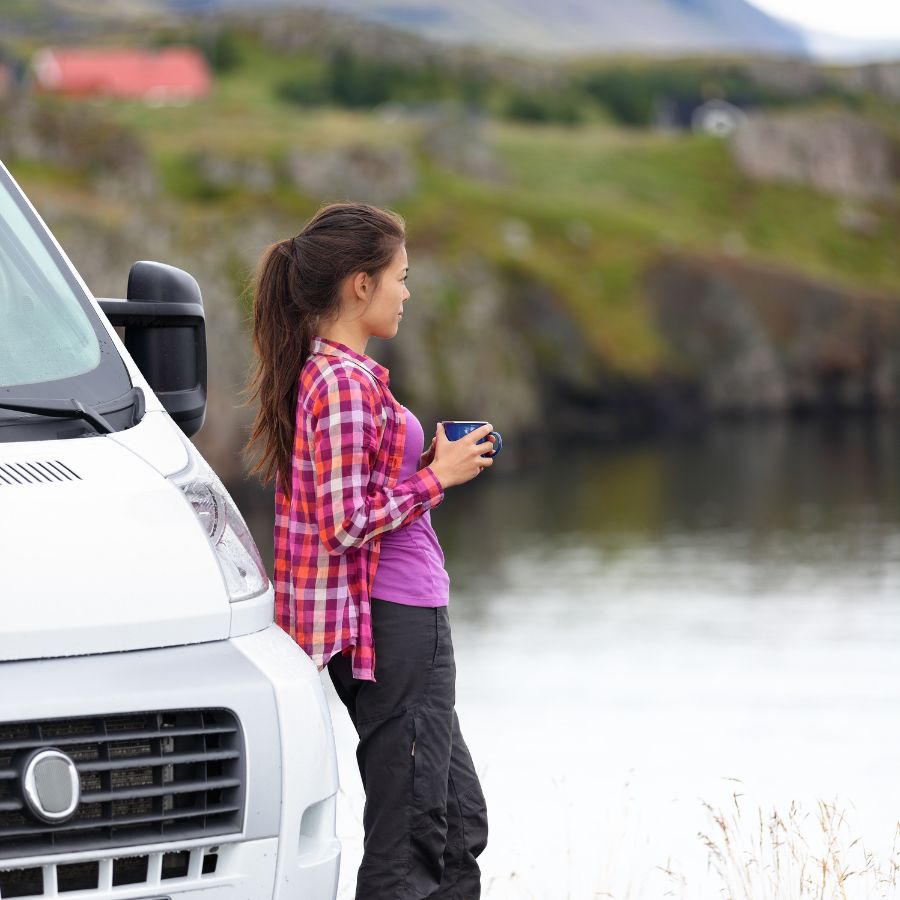


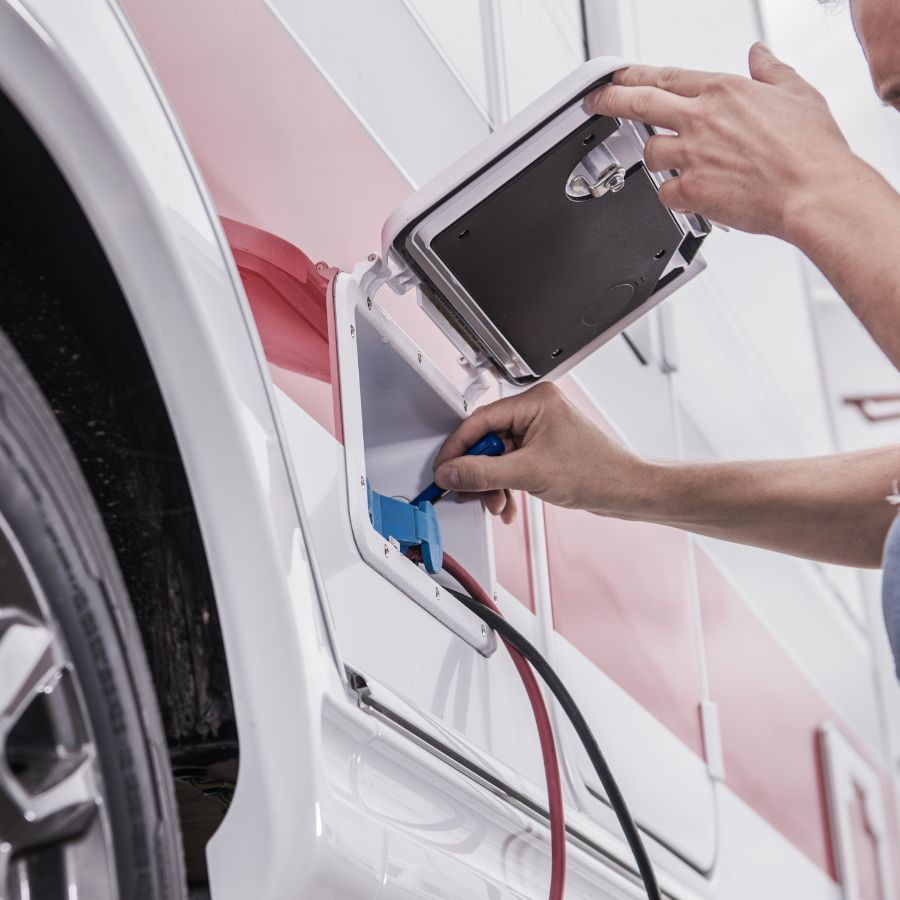

3 minutes reading time (546 words)
AI-powered predictive maintenance for RVs involves using advanced algorithms to analyze data from various sensors and systems within the vehicle to predict potential issues before they occur. This proactive approach helps RV owners and operators avoid unexpected breakdowns, reduce repair costs, and increase the overall reliability of the vehicle. Here's how AI predictive maintenance can be implemented for RVs:
Sensor Data Collection:Equip the RV with a network of sensors capable of monitoring various components such as the engine, transmission, brakes, tires, and other critical systems. These sensors continuously collect data on parameters like temperature, pressure, vibration, and fluid levels.Data Integration:Integrate the data collected from sensors into a centralized system or cloud-based platform. This platform serves as a repository for the diverse data streams generated by the RV's different components.Machine Learning Algorithms:Implement machine learning algorithms that can analyze historical and real-time data to identify patterns, anomalies, and trends. These algorithms can learn from the RV's performance over time and predict when specific components are likely to require maintenance.Failure Prediction:Develop models that can predict potential failures or malfunctions in critical systems. The AI system can analyze changes in sensor data patterns that may indicate wear and tear, overheating, or other issues, allowing for timely intervention.Condition-Based Maintenance Alerts:Set up condition-based maintenance alerts that trigger notifications when the AI predicts that a specific component is approaching the end of its optimal operating condition. These alerts can prompt RV owners to schedule maintenance before a major issue arises.Predictive Analytics Dashboard:Provide users with a user-friendly dashboard that displays predictive analytics related to the RV's health. This dashboard can include information on upcoming maintenance tasks, component lifespans, and recommendations for preventive measures.Integration with RV Monitoring Systems:Integrate AI predictive maintenance systems with existing RV monitoring systems and telematics. This allows for a comprehensive overview of the RV's performance, combining predictive maintenance insights with real-time monitoring data.Dynamic Maintenance Scheduling:Implement dynamic maintenance scheduling based on the predicted health of various components. Instead of relying on fixed schedules, AI can optimize maintenance timing to minimize downtime and maximize the efficiency of RV operations.Remote Diagnostics:Utilize AI for remote diagnostics, allowing RV owners, service centers, or manufacturers to assess the vehicle's condition and potential issues without physically inspecting it. Remote diagnostics can streamline the maintenance process and reduce the need for unnecessary trips to service centers.Integration with OEM Recommendations:Integrate AI predictive maintenance systems with original equipment manufacturer (OEM) recommendations. This ensures that the algorithms consider the manufacturer's specifications and guidelines when predicting maintenance needs.Cost Analysis and Budgeting:Implement features that analyze the cost implications of potential maintenance activities. This can assist RV owners in budgeting for upcoming maintenance tasks and making informed decisions about prioritizing repairs.Continuous Learning and Improvement:Enable the AI system to continuously learn and improve its predictive capabilities over time. This involves updating the algorithms based on new data and insights, ensuring that the system becomes more accurate and effective with each use.Implementing AI predictive maintenance for RVs requires collaboration between technology developers, manufacturers, and RV owners. As the technology evolves, it has the potential to significantly enhance the reliability and longevity of RVs while minimizing the inconvenience and cost associated with unexpected breakdowns.
